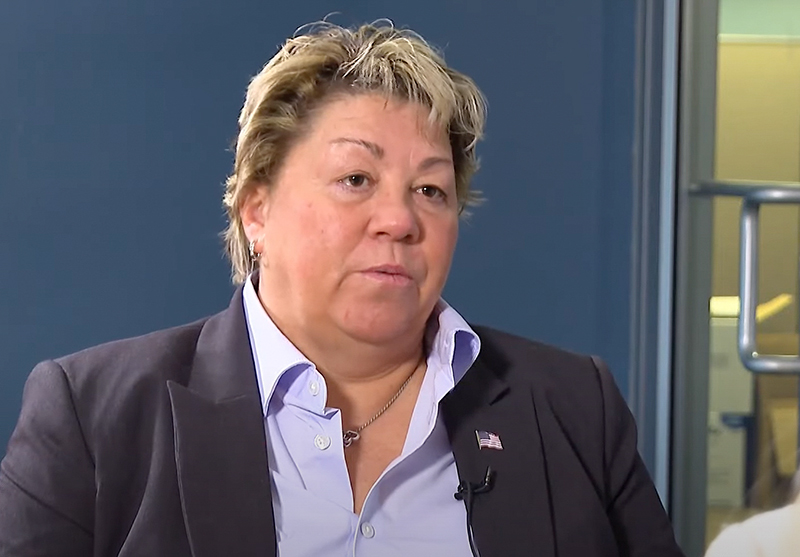Congressional Bill Would Enshrine Marriage Equality in Law
Bipartisan "Respect for Marriage Act" would allow same-sex marriage, even if Supreme Court attempts to reverse landmark decision

A bipartisan group of congressional lawmakers are backing a bill that would codify same-sex marriage into law.
The “Respect for Marriage Act,” co-introduced by U.S. Sens. Tammy Baldwin (D-Wis.), Dianne Feinstein (D-Calif.), and Susan Collins (R-Maine), would repeal the Defense of Marriage Act, a 1996 federal law that defines marriage as an institution between one man and one woman, and negates any federal recognition of same-sex relationships.
A portion of DOMA was declared unconstitutional and voided by the U.S. Supreme Court in the Windsor v. United States case in 2013, although the law is still technically in place, and unenforceable. However, a recent concurring opinion by Supreme Court Justice Clarence Thomas in a contentious case involving the right of a woman to obtain an abortion suggests that conservative jurists may revisit both the DOMA decision and the case the followed it, the 2015 Obergefell ruling, which legalized same-sex nuptials nationwide.
Under the Respect for Marriage Act, states would be required to legally recognize same-sex and interracial marriages if those marriages are valid in the state where the wedding ceremony was held, regardless of where the partners live.
The act would also prohibit discrimination “based on the sex, race, ethnicity or national origin of the individuals in the marriage,” and would allow those who have been discriminated against to bring pursue legal action.
“Marriage equality is a constitutional right that has been well established by the Supreme Court as precedent, and this freedom should be protected,” Baldwin said in a statement after introducing the bill. “The bipartisan Respect for Marriage Act will enshrine and protect marriage equality and make sure legal, same-sex and interracial marriages are recognized.”
During a press conference, Collins talked about the importance of Americans “marrying the person whom they love,” arguing that the Respect for Marriage Act would support all couples equally.
“During my time in the Senate, I have been proud to support legislation prohibiting discrimination based on sexual orientation and gender identity, from strengthening hate crime prevention laws, to repealing ‘Don’t Ask, Don’t Tell,’ to ensuring workplace equality,” she said. “This bill is another step to promote equality, prevent discrimination, and protect the rights of all Americans.”
A nearly identical version, introduced by Rep. Jerrold Nadler (D-N.Y.), has been introduced in the U.S. House of Representatives. On Tuesday afternoon, the House was slated to vote on the bill.
Among those co-sponsoring the measure are members of the Congressional LGBTQ+ Equality Caucus, which is headed by the nine out LGBTQ members of Congress: Reps. Mark Pocan (D-Wis.), Mark Takano (D-Calif.), David Cicilline (D-R.I.), Mandaire Jones (D-N.Y.), Sean Patrick Maloney (D-N.Y.), Ritchie Torres (D-N.Y), Angie Craig (D-Minn.), Sharice Davids (D-Kansas), and Chris Pappas (D-N.H.). Other sponsors include Reps. Raul Ruiz (D-Calif.), Judy Chu (D-Calif.), Joyce Beatty (D-Ohio,), and Hakeem Jeffries (D-N.Y.), all of whom represent districts with significant LGBTQ populations.
The bill is supported by various legal, human rights, and women’s groups. LGBTQ advocates ave balked at the prospect of Obergefell being overturned if the high court adopts Thomas’s view that any rights not explicitly mentioned or enumerated in the Constitution are not protected by it — just as it did when it overturned the unenumerated right to obtain an abortion.
Samuel Alito and the court’s other justices who co-signed the majority opinion in the recent Dobbs abortion case have insisted that they are not looking to revisit substantive due process cases like Obergefell, not based on any legal standard, but the fact that abortion involves a fetus that has the potential for human life. But many advocates are skeptical about that claim, and believe legislative action by Congress would offer a better avenue to preemptively protect the right off same-sex marriage.
“LGBTQ Americans and those in interracial marriages deserve to have certainty that they will continue to have their right to equal marriage recognized, no matter where they live, should the Court act on Justice Thomas’s draconian suggestion,” House Majority Leader Steny Hoyer (D-Md.) said in a statement explaining the expedited floor vote, according to The Hill.
As of press time, the legislation appeared likely to pass the House of Representatives on a party-line vote on Tuesday, leaving it to the U.S. Senate whether to allow a vote on same-sex marriage. However, given the reticence of the Democratic majority to eliminate the legislative filibuster, and the more conservative tilt of the GOP caucus in the Senate over the past few cycles, it is unlikely that same-sex marriage will be enshrined in law anytime soon — meaning supporters will likely have to revisit the issue in future sessions of Congress.
“If Justice Thomas’s concurrence teaches anything its that we cannot let your guard down or the rights and freedoms that we have come to cherish will vanish into a cloud of radical ideology and dubious legal reasoning,” Nadler said in a statement. “As this Court may take aim at other fundamental rights, we cannot sit idly by as the hard-earned gains of the Equality movement are systematically eroded.”
Support Metro Weekly’s Journalism
These are challenging times for news organizations. And yet it’s crucial we stay active and provide vital resources and information to both our local readers and the world. So won’t you please take a moment and consider supporting Metro Weekly with a membership? For as little as $5 a month, you can help ensure Metro Weekly magazine and MetroWeekly.com remain free, viable resources as we provide the best, most diverse, culturally-resonant LGBTQ coverage in both the D.C. region and around the world. Memberships come with exclusive perks and discounts, your own personal digital delivery of each week’s magazine (and an archive), access to our Member's Lounge when it launches this fall, and exclusive members-only items like Metro Weekly Membership Mugs and Tote Bags! Check out all our membership levels here and please join us today!
























You must be logged in to post a comment.